- Home
- Lynne Reid Banks
Two Is Lonely Page 5
Two Is Lonely Read online
Page 5
I did what I was told. I very nearly always found myself doing what he told me. But this time, as I carried out this small, apparently meaningless action, I was abruptly overtaken by the feeling that by doing it I was committing myself; something was being shared, accepted, promised. After tapping two corners, I gave the trowel back.
‘You haven’t finished.’
I shook my head. He looked at me, frowning slightly, and slowly took the trowel from me and tapped the other two corners again himself. The men were watching, smiling knowingly. I stared at the stone, wondering to myself: ‘What does this mean? They understand something. Andy is one of them, and this ceremony means something to all of them that I know nothing about.’ I noticed there was engraving on the stone. The date:
May 14th, 1967
Afterwards the slight tension broke and we all walked back to the table where I was invited to dispense drinks. Most of the men were locals; I had served drinks to some of them when I was Alf’s assistant at the Swan. Yet none of them gave me a teasing wink or referred to it in any way. Instead they responded with polite thanks, and one of them called me ‘ma’am’. The courtesy was not strained; the mere fact that I was a woman and was handing them a drink, would have ensured no less. But the ‘Ma’am’ was more than my ordinary position in the village would entitle me to, or had ever been accorded me before, except by kind Mr. Rudge. It made me feel faintly uncomfortable. Did they already regard me—perhaps because of the little ceremony in which Andy had arbitrarily involved me—as the ‘squire’s lady’?
‘Now,’ said Andy, ‘what about going into the village for a bite of lunch? I’ve ordered it.’
‘Oh, but I can’t. I told you this morning. I’m on duty with the kids—I’m meeting them here. Can’t think why they haven’t got here yet.’ I looked round, searching the softly-curving green horizon on all sides for the sight of domed velvet caps and pointed pony-ears.
‘Hell, I’d forgotten that! I could have brought the champagne here, and a “pack-lunch” as Chris always used to call it at school.’
I registered the mention of his son—not quite the first, but so nearly as to make it almost sinister in its rarity.
‘But I’ve brought a picnic. No champagne, of course, but plenty for all of us. Why champagne, anyway?’ I thought to ask as an afterthought.
‘I always drink champagne on special occasions.’
‘And is this one?’ I asked innocently.
‘Isn’t it?’
‘The foundation stone of your house?’
‘Not only.’
‘You are such a cryptic fellow, aren’t you?’
I looked sideways at his secretive, quietly smiling face. This situation, in which so much was felt and so little said, suddenly seemed to me intolerable and unnatural. Full of feminine curiosity, I longed to know about him—his marriage, his odd estrangement from his son, and most of all, needless to say, his plans for the future. Why for example had his new house been delayed several months because of radical revisions to the original plans? When I had asked him what the changes were, he retreated into his ‘Wait and see’ routine, which gave me the half-excited, half-uneasy conviction that they somehow concerned me. This was the first indication I had had that he wanted to marry me, and there had been others since, coming to a climax with this morning’s ceremony and the mention of champagne. But if so, why, why didn’t he say something? Was he simply taking it for granted, without a word, without a kiss, that it was all settled? Quite impossible, surely. And yet he had this quality of inwardness, entirely incomprehensible to an extrovert like me. Our relationship developed under cover of small talk, where I could neither watch it nor be sure of it but could follow its progress only by emotional instinct.
He knew very little about me. He didn’t even know—or if he did, not from me—that David was illegitimate. I hated him not knowing, though I supposed, not without some deep intuitive uneasiness, that in this day and age if he really cared for me it would not make very much difference. Several times I had trembled on the brink of telling him; but something always kept me silent.
It began to rain. Instantly I stopped thinking about Andy and began worrying seriously about the children.
‘They’re half an hour overdue . . . I wish they’d come.’
‘Let’s sit in one of our cars.’
We sat in his. As always, a car interior provided a private-feeling haven, warm, safe and intimate. I am never surprised by the number of indiscretions which occur in cars, despite the physical contortions which must be necessary. Instinctively I huddled close to Andy’s warm male bulk as the rain began to lash down in earnest against the windscreen.
‘Could you run the wipers so I can watch for them?’
He turned them on. ‘Would you like me to cruise around the lanes and look for them?’
‘No, we’d better wait here.’
He took my hand and tucked it, with his, into his deep coat pocket.
‘You’re cold.’
‘Just my skin . . . The wine’s keeping me warm inside.’
‘Do you think wine was the wrong thing? Most of the men left theirs.’
‘Beer might have been better.’
‘Damn. Thoughtless of me.’
‘Thoughtlessness is hardly one of your faults.’
He smiled at me. I drew my breath in a deep sigh. He was wildly attractive to me now. What kept us apart? Not just unspoken words. It struck me suddenly, as his eyes withdrew from me in an uncharacteristically nervous little movement, that he might—sense Toby.
‘Why don’t we ever talk?’ I brought out abruptly.
He glanced at me sharply, then away through the windscreen at the glossy lane, the wet hedges. The windscreen-wipers swept to and fro, to and fro, as my mental ones had that morning.
‘Too much to say, I suppose. Where to begin?’
‘You behave like a man with a past,’ I said with half a laugh.
‘Aren’t we all that?’ He squeezed my hand. ‘Oh, nothing villainous. Just . . . I’d like you to know everything, to share me like a Siamese twin, but there’s no way. And the compromise between total sharing and inevitably-partial communication by word of mouth is hard to embark on.’
‘But as it is inevitable—’
Now it was he who sighed. ‘I know. Of course I know. Did you ever read that novel about future mutant humans who could read each other’s thoughts and send mental pictures to each other? It struck me that’s what one needs to create a proper love-relationship, nothing less than that—direct, mind-to-mind communication. Instead of filtering it all through mere words . . . Words are like condoms in that connection. The communication penetrates, but it can’t produce a true conception in the other person. That can only happen through some kind of spiritual meeting which takes ages to develop, and I sometimes think words are actually a barrier to that kind of coming together.’
I sat silent. There was truth in it.
‘But I want to talk,’ I said at last. ‘Feelings, moods, impulses can be transmitted in the way you mean, between two people who—’ I hesitated, conventionally afraid to be the first to say it— ‘who love each other enough. But there are the facts. Since we can’t read each other’s thoughts, and frankly I prefer it that way, there’s only the one other method of conveying all that’s happened to us in our lives up to now. After all, half our lives are over, we’ve lived them apart from each other. It’s not enough to say, as it were, “Well, here we are, whatever’s happened to us till now has added up to you being as you are and me as I am, and if we like what we seem to be, that’s good enough.” Sooner or later we have to—simply—tell each other things.’
‘Can’t we take each other on trust?’
I thought about this for some time, as deeply as possible while half my mind was wondering where on earth the kids were and reflecting how wet they must be. Eventually I answered, ‘I don’t know. Is it just plain curiosity that makes me want to know about you, your family, your marriage,
your son and so on? Could I repress it as something unworthy or unnecessary? Maybe I could . . . though it would be against my nature, and it would be there, like Bluebeard’s cupboard, tickling my imagination, always . . . But even if I could take you on trust, you’d be very silly to take me.’
He smiled at me, almost mockingly. ‘Now you talk like someone with a past.’
‘Well . . . I am.’
He raised his eyebrows in mock interest and surprise, but despite the joking quality in his expression, I sensed something else—a sudden doubt, a sudden unease.
‘And must you tell me all about it?’
‘That depends.’
‘On what?’
‘On—well. On what this morning’s little ceremony really meant.’
Now the mock-surprise became entirely genuine and disconcerted. ‘Well, really! It means exactly what you must know it means. If you are not perfectly clear in your mind about that, then my theories about wordless communion must be just so much old cod’s-wallop.’
A faint clop-clop behind us made me swing round. Amanda, her black riding-hat shining on her bent head so that it looked like the head of a seal, was trotting round the bend on her sodden pony. There was no sign at all of David.
I was out of the car in a moment and running through the rain to meet her.
‘Amanda! Where’s David?’ I asked as I splashed to a halt and grabbed the bridle.
‘He fell off, the silly clot. He’s crying back there and he won’t get up. I said I’d come and get you—’
‘Get into the back of the station-wagon. How far away is he? Far enough to drive?’
‘Oh no, he’s in that field back there, you can’t get there in a car. Here, take Ant.’
‘No thanks, I’d rather run . . . Andy, will you come?’
I was in a cold panic as I dashed round the corner, through a gate (which Amanda had inexcusably left open, and which I even less excusably did too) and up a steepish slope which was already streaming with muddy water. I hadn’t worn my boots for once and the stream overflowed my shoes immediately. Andy was ahead of me by now. I saw him disappear over the brow of the hill as I struggled and slipped, and then I heard Bee whinny just out of sight. My mind was full of broken arms, legs and collar-bones . . . At least it could be no worse on this soft ground.
In fact it was a good deal better. When I panted up to the far gate, there was David, covered with mud and muck, his limbs straight and sound and not a scratch on him that I could see, sniffing sheepishly and trying ineffectually to brush the mud off his jodhpurs. He was steadfastly refusing to answer Andy’s questions about where, or if, he was hurt, and he likewise refused to meet my frightened, but already suspicious, eyes.
‘Are you hurt or aren’t you?’ I almost yelled, wanting to shake him. I’d seen this syndrome before. Fall, shock, minor discomfort, disproportionate howls, filling me with never-failing terror of mortal injuries—and then, anti-climax, chagrin and sulks. Usually he pretended for quite a while he was hurt, just to save face, but perhaps he was growing up, or just learning that it wouldn’t wash, because after a hesitation he shook his head.
I felt unaccountably more furious than usual. I really had been frightened, and besides, my shoes were full of muddy water and I’d torn my tights and snagged my best skirt on a bramble.
‘Damn it all, then why didn’t you remount and ride back instead of sitting there boo-hooing like a baby?’
David sniffed and hung his head. ‘I thought I’d broken my shoulder,’ he muttered. Then he looked up and added more spiritedly, ‘It was all that stupid Amanda’s fault, pushing through the gate like that and making Bee buck.’
‘It’s a very nasty feeling, falling off a bucking pony,’ Andy put in unexpectedly. I stared at him, with some indignation at first, but then suddenly I felt rather sheepish myself, and a bit jealous too, because David was rewarding his defender with a look of gratitude and warmth which I might have earned myself by the expenditure of a trace of maternal sympathy.
‘Oh well . . . Come on, let’s go back and eat, before Amm scoffs all the chicken.’
As we walked back together down the slithery hill, with David between us and Bee breathing heavily on us from behind, I reflected that satisfaction, and not resentment, would be a more appropriate reaction to Andy’s sudden intervention on David’s side. He had, in the past, stood aside quite passively during any parental exchanges, hands in pockets, jingling his keys embarrassedly and staring in a different direction. Such a stance proclaimed louder than words, ‘Nothing to do with me.’ Today’s volte-face presupposed a new attitude, one which would be essential for him soon to adopt towards David’s and my tight little ménage, if . . .
We picnicked, uncomfortably but quite happily, in my station-wagon, us in the front, the kids muddying up the rugs in the back. Andy disappeared in the direction of the site and returned with half a bottle of Mâcon which the men had spurned. There’s nothing like wine for transmogrifying an ordinary picnic into a festive occasion.
‘Shades of Glyndebourne,’ I mumbled indistinctly through a mouthful of cold roast chicken.
‘You’ve obviously never done Glyndebourne,’ said Andy. ‘A very far cry, I assure you. We’ll go this summer—I’ll book tomorrow.’
‘Cor.’
‘You don’t want to,’ he realised affrontedly.
‘It’s on account of not liking opera much. Now, if you started muttering about Chichester or the Edinburgh Festival . . .’
‘H’m. I see we have indeed a great deal to learn about each other, much of it evidently seriously to your discredit.’
‘You mean, my philistinism about everything but the theatre?’
‘Never mind.’ He patted me avuncularly on the head. ‘I’ll strive to overlook it, if I fail to correct it.’
‘Ta ever so,’ I said drily. ‘It must be nice to be so culturally enlightened.’
‘Oh, it is, it is! All my own work, too.’
I had to turn my face to the window to hide the sudden flush that came over it. It was at moments like this, when we were fooling around, that I felt the abrupt, incongruous onset of desire. I suppose it was my body’s response to my mind’s delight that we shared the same silly sense of humour. But in any case I often seemed to want him when we were eating. Food and sex, or rather the appetite for them, are very closely linked in me. I love food. I love the sight of it growing—in fields, on trees, on the hoof. I love seeing shops and markets full of it, clean and rich in all its natural colour and promise—even pictures in cookery books bring out the beast in me. I love buying it and preparing it in such a way that it will tempt all the senses and do credit to the good wholesome earth that produced it. And of course I love eating, and watching people I love eat. After all, there is a close parallel between the actions of eating and making love. Both are so sensual; both involve touching and smelling and tasting, handling and biting, caressing with the lips and tongue. And both are so natural, so satisfying, so much more exciting in proportion to how strong your appetite is, how long you’ve waited, and how well you’ve earned it . . .
‘What are your plans for now?’
‘What? Oh. I thought I’d do some shopping in the village and drop into the shop on the way back, and then make tea for the kids.’
‘What will they do meanwhile?’
‘Ride home to Jo’s, have a bath and change. I hope.’
‘Did you get that, David?’ asked Andy over his shoulder in an unwontedly sergeant-major tone.
‘What?’ asked David unwarily, looking up from his meal.
‘Ride home. Bath. Change of gear. I quote your mother.’
‘Oh, okay,’ he said in a casual tone which told me it was already out of the other ear and floating off into the ether.
‘Amanda, have you finished eating?’
‘Not quite. Super cake, auntie.’
‘Well, the rain’s stopped, so you can take your cake and start for home. Did you hear the bit about having a bath?’<
br />
‘Okay. Then can we watch Dr. Who?’
‘Must you? Oh, all right then. I’ll be back before then anyhow.’
I thought David looked a little relieved. The Daleks with their throaty extermination threats have never commended themselves as strongly to him as to the tough-minded, unimaginative Amanda.
‘And what about me?’ put in Andy plaintively.
‘No fun for you, pottering about the shops . . .’
‘Oh I don’t know. I could carry your parcels.’
‘What a thrill for you. Would you really?’
‘Speak now while you see me.’
‘I’ve spoken.’
The children had been carrying on a subdued quarrel in the back for some moments, and now David’s voice rose resentfully.
‘Well, look who’s talking. You know we’re not allowed to jump yet, but you—’
Before he could finish, Amm had flung herself on top of him, chicken-leg and all, and began banging his head very roughly on the floor.
‘You bloody little tell-tale!’ she shouted.
‘Amanda!’ I cried, though it was not the first time. Casual swearing seems to be a habit neither Jo nor I can break ourselves of, and of course the kids pick it up. As we’ve often said, it’s our fault and you can’t blame them, but it really does give you a jolt to hear little children saying ‘bugger’ and ‘Jesus’ and we do try to stop both them and ourselves.
‘Well, he is, Auntie! He promised not to tell!’
‘OW!’
My fingers itched to pull her off, but they’re pretty evenly matched and it galled me to have to rescue him from a mere girl (not that Amm could ever be accurately described as ‘mere’).
‘Enough, Amanda! Why is it such a secret, anyway?’
Amanda reluctantly desisted, picked up her horse-hairy cake which had gone flying, and said sulkily, ‘It’s too silly, but Mummy says we have to learn jumping from Mr. Rogers first.’
‘Oh. Yes. Quite right. Well, go on, get off home. And David, don’t cry, for God’s sake.’
I was a bit over-impatient with him, first for telling tales which I’ve begged him not to do, second for letting Amanda beat him, but most of all, perhaps, for not being the one who had done the forbidden, daring thing. It was hard to understand myself at moments like this. I didn’t want a ruffian; I was much happier to share my life with someone quiet, thoughtful and gentle. But I was constantly, not always consciously, anxious about the lack of positive maleness for which I felt myself responsible. I had so much wanted a boy; and now that he had left sexless babyhood behind I longed for the masculinity which had so long been lacking in my life, even if it were at one generation’s remove . . . But it’s only now, much later, that I’m able to admit it to myself. It was too dangerous to face then, in that situation; his timidity, his slight effeminacy were not only worrying, they were a source of potential and actual guilt, for who does not know that out of such situations the majority of unmale men emerge, crippled for life by their devoted, unmitigated mothers?

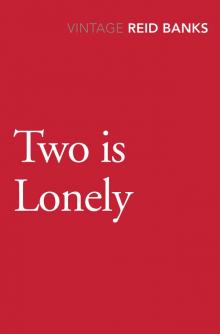 Two Is Lonely
Two Is Lonely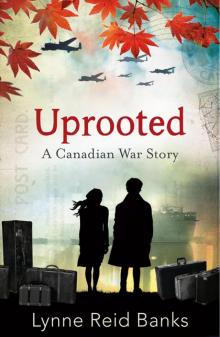 Uprooted - a Canadian War Story
Uprooted - a Canadian War Story The Backward Shadow
The Backward Shadow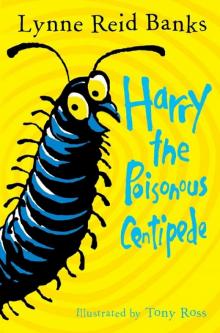 Harry the Poisonous Centipede: A Story to Make You Squirm
Harry the Poisonous Centipede: A Story to Make You Squirm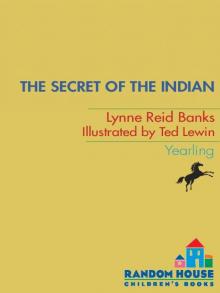 The Secret of the Indian (The Indian in the Cupboard)
The Secret of the Indian (The Indian in the Cupboard)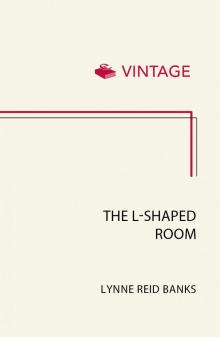 The L-Shaped Room
The L-Shaped Room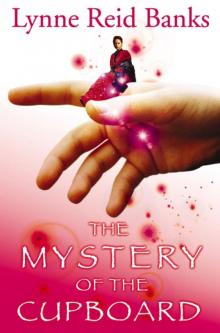 The Mystery of the Cupboard
The Mystery of the Cupboard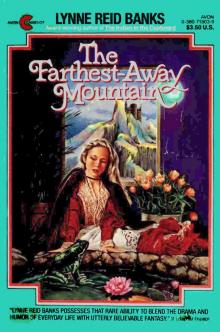 The Farthest-Away Mountain
The Farthest-Away Mountain Harry the Poisonous Centipede Goes to Sea
Harry the Poisonous Centipede Goes to Sea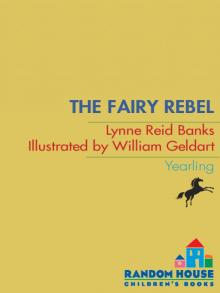 The Fairy Rebel
The Fairy Rebel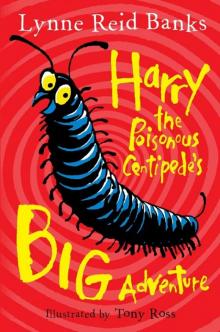 Harry the Poisonous Centipede's Big Adventure: Another Story to Make You Squirm
Harry the Poisonous Centipede's Big Adventure: Another Story to Make You Squirm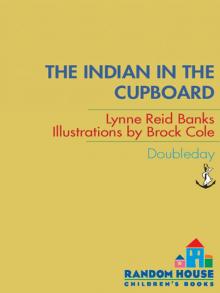 The Indian in the Cupboard
The Indian in the Cupboard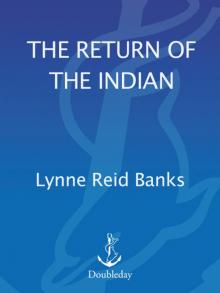 The Return of the Indian
The Return of the Indian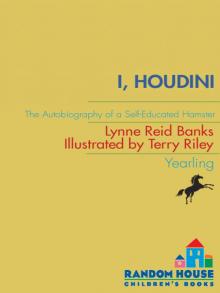 I, Houdini
I, Houdini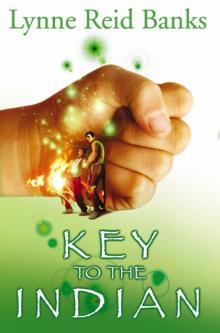 The Key to the Indian
The Key to the Indian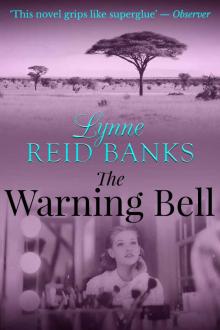 The Warning Bell
The Warning Bell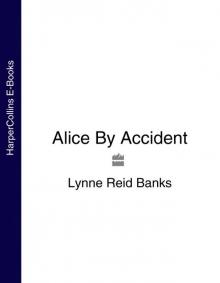 Alice by Accident
Alice by Accident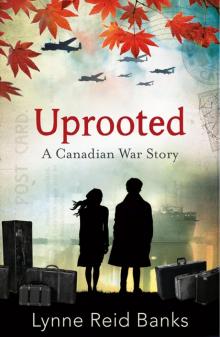 Uprooted
Uprooted Writing On the Wall
Writing On the Wall The Adventures of King Midas (Red Storybook)
The Adventures of King Midas (Red Storybook)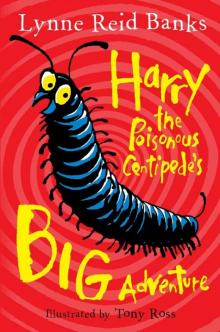 Harry the Poisonous Centipede's Big Adventure
Harry the Poisonous Centipede's Big Adventure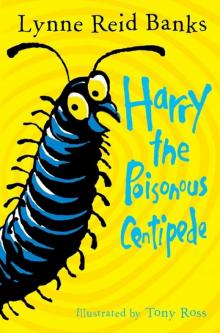 Harry the Poisonous Centipede
Harry the Poisonous Centipede The Dungeon
The Dungeon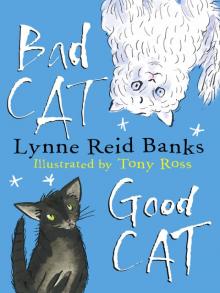 Bad Cat, Good Cat
Bad Cat, Good Cat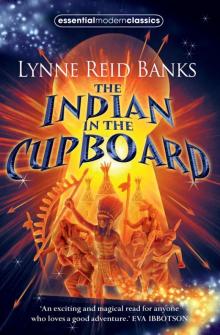 The Indian in the Cupboard (Essential Modern Classics, Book 1)
The Indian in the Cupboard (Essential Modern Classics, Book 1)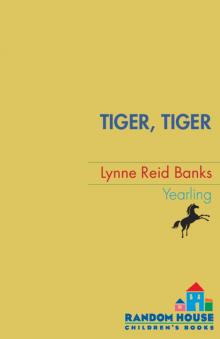 Tiger, Tiger
Tiger, Tiger